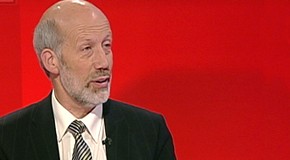
David Ford, leader di Alliance Party, ha detto che la coalizione tra Sinn Fein e DUP dovrebbero fare di più per eliminare le divisioni settarie, prima che lui esprima la sua candidatura.
Come parte dell’accordo sul trasferimento dei poteri di ordine pubblico e sulla gestione delle parate annunciato venerdì scorso, il primo ministro Peter Robinson (DUP) ed il suo vice Martin McGuinness (Sinn Fein) hanno incontrato oggi a Stormont i partiti minoritari per considerare le candidature per il ruolo di ministro della Giustizia.
I due partiti maggiori si sono accordati per non presentare dei propri candidati.
E mentre l’Ulster Unionist Party e lo SDLP hanno una grande forza elettorale nell’Assemblea, l’Alliance Party è considerato l’unico che potrebbe ottenere il sostegno intercomunitario necessario nel corso di una votazione.
Ma Ford ieri ha detto che il suo partito non è ancora nella posizione di presentarsi per il ruolo, perché le politiche del nuovo ministero non sono state illustrate adeguatamente.
Il politico non è soddisfatto della mancata pubblicazione, da parte di Robinson e McGuinness, della strategia per contrastare la divisione nella società nordirlandese.
“Sulla base dell’incontro dei leader di domani, non ci sarebbe una nomina dell’Alliance” ha riferito a Radio Ulster.
“Se le cose cambiano, allora le cose dovrebbero cambiare. Ma l’attuale posizione è che non abbiamo visto abbastanza movimento intorno alla strategia per le relazioni comunitarie e sulle politiche che dovrebbero essere implementate dal ministero della Giustizia”.
Sia l’UUP che lo SDLP hanno criticato le voci secondo cui l’Alliance Party sarebbe la scelta preferita di DUP e Sinn Fein, accusando i due partiti di imbrogliare sulla selezione.
Gli 11 ministri che compongono l’Esecutivo sono stati scelti utilizzando il sistema D’Hondt.
Se il processo fosse rifatto, invece del voto in Assemblea, lo SDLP avrebbe un ministro aggiuntivo. Comunque, nel caso di una nuova applicazione del metodo, il posto di ministro della Giustizia potrebbe finire nella mani dell’Ulster Unionist Party perché avrebbero possibilità di scegliere il ministero preferito prima del partito nazionalista.
Sia UUP che SDLP sono favorevoli all’applicazione del metodo D’Hondt.
In base ai termini dell’Accordo di Hillsborough Castle, i poteri sulla giustizia saranno trasferiti da Westminster a Stormont il 12 aprile.
Prima di proseguire con il trasferimento, alcune questioni dovranno essere affrontate, tra cui la scelta del ministro ed i cambiamenti proposti per la gestione delle parate.
Alliance leader David Ford may turn down Justice Minister job
Alliance Party leader David Ford said the ruling Sinn Fein/Democratic Unionist coalition would have to do more to tackle sectarian divisions before he would put his name forward.
As part of the broad-ranging agreement on law and order devolution and parade management announced on Friday, DUP First Minister Peter Robinson and Sinn Fein Deputy First Minister Martin McGuinness are to meet with Stormont’s minor parties today to consider applications for the justice ministry.
Both main parties have agreed not to nominate candidates from their own ranks.
And while the Ulster Unionists and SDLP have greater electoral strength within the Assembly, the non-aligned Alliance Party is considered the only one that could achieve the necessary cross-community backing of both the DUP and Sinn Fein in a vote.
But Mr Ford yesterday said his party was not yet in a position to apply for the post, claiming policies for the new ministry have not been properly outlined.
He is also unhappy that Mr Robinson and Mr McGuinness have still not published a long-delayed strategy to tackle division in Northern Ireland society.
“On the basis of a leaders’ meeting tomorrow there would not be an Alliance nomination,” he told Radio Ulster.
“If things change then things may change. But the current position is that we have not seen enough movement around a community relations strategy and around getting all the policies that we believe should be implemented by a department of justice.”
Both the Ulster Unionists and SDLP have criticised the notion of Alliance being the DUP and Sinn Fein’s preferred choice, accusing the main parties of gerrymandering the selection.
The current 11 ministries in the Executive were allocated using the D’Hondt system.
If that process was re-run, instead of the cross-community vote in the Assembly, the SDLP would be given an extra ministry. However, in that case the justice post may well end up in the Ulster Unionists’ hands as they would pick their preferred portfolio before the nationalist party.
Both the UUP and SDLP favour retaining the D’Hondt system.
Under the terms of the Hillsborough Agreement, justice powers are set to be devolved from Westminster to Stormont on April 12.
However a number of matters, including the selection of a minister and proposed changes to parade management processes, need to be resolved before that can go ahead.